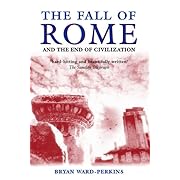
I just finished "The Fall of Rome and the End of Civilization"
last night. It's a quick read, less than 200 pages. The author
attacks the current notion that Rome was "transformed" by the
barbarian invasions - which seems to be some kind of politically
correct fantasy of academia at the moment.
Using archeological evidence of former abundance (types of buildings, pottery that was in use, etc), Ward-Perkins shows that many areas of the empire literally fell backwards - and that the areas held by the Eastern Empire into the 6th and 7th century maintained their standard of living.
The end of the book makes a cautionary point as to why some areas on the Empire's periphery - like Britain - fell so far. Rome was an empire of specialized jobs and economics. People did not know how to create common household items (like pottery) themselves, as they could buy high quality, inexpensive goods easily. When the collapse came, the dependent population was left without skills.
The parallels to today's world are obvious. There's a show on TV we watch called "Jericho", which posits a nuclear exchange, complete with an EMP. The show focuses on a small town, so when they get cut off from communications, they have no idea what happened, why it happened, or how widespread the attack was. The writers have covered the difficulties of such a catastrophe to some extent, but I don't think they've really hit it completely. Unlike our 19th century forbearers, we simply don't have the skills necessary to survive without the long, complex supply lines provided by the modern world. It's a chilling thought, and made me sympathize heavily with the people who had to live through the collapse of the Roman world.
Technorati Tags:
apocalypse, history, Roman Empire